One-stage dental implantation
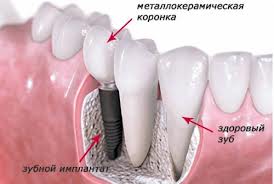
One-stage dental implantation – This is a technique for dental implants in one medical appointment.
This technology is currently very popular. One-stage dental implantation is performed on an outpatient basis using local anesthesia and takes less than an hour.
Most often, an implant placement operation is performed after tooth extraction. Then the root canal is enlarged and the implant is installed. Since its head protrudes beyond the edge of the gum, it is possible to install a temporary crown on the same day.
This approach allows you to immediately restore the functional load and give aesthetics to the teeth.
After implant engraftment (approximately three to five months), instead of a temporary implant, a permanent dental crown is established.
The general condition of the patient’s body is also of great importance, and there should be no contraindications to the operation.
According to statistics from both Russian and foreign specialists, the reliability and effectiveness of one-stage dental implantation is 100%.
Contraindications
Conducting a one-stage implantation becomes impossible if there are absolute contraindications:
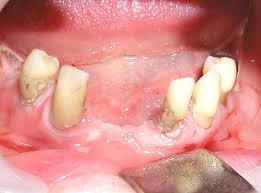
- Bone system diseases: osteoporosis (loosening and bone porosity).
- Inflammatory diseases of the gums and oral mucosa.
- Decreased immunity.
- In the case of a wide hole in the extracted tooth, if the implant cannot be tightly mounted.
- The presence of an inflammatory process in the jawbone (granulomas, cysts).
- Diseases of the blood and blood forming organs.
- Mental illness.
- Malignant neoplasms.
- Periodontal disease.
- Allergy to drugs used for anesthesia.
- Atrophic changes in bone tissue and alveolar processes.
- Diabetes.
- Diseases of the endocrine system.
- The presence of sexually transmitted diseases. AIDS.
- A complicated form of tuberculosis.
- Connective tissue diseases.
- Increased tone of the masticatory muscles.
Relative contraindications for one-stage implantation:
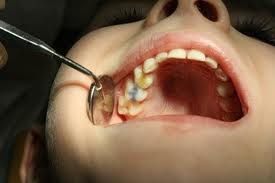
- The presence of rotten, carious teeth.
- Inadequate oral hygiene.
- Alcoholism, drug addiction, smoking addiction.
- The presence of a deep bite.
- During pregnancy.
- Periodontitis
- Gum disease
- Arthrosoarthritis of the joints.
All contraindications, except absolute and general, are easily eliminated.
For example, smoking is incompatible with implantation. Smokers increase the likelihood of rejection of implants, therefore, no less than 10 days before surgery, it is necessary for the patient to give up smoking.
There are general contraindications for the operation:
- An exacerbation of chronic somatic diseases that can be triggered by surgery.
- The use of drugs that affect blood coagulation, antidepressants, etc.
- Staying in a state of prolonged stress.
- General exhaustion of the body.
Implant placement may have local contraindications:
- Lack or lack of hygienic oral care.
- Insufficient distance to the nasal and maxillary sinuses.
One-stage implantation is temporarily impossible for the reasons:
- Acute stage of the disease.
- At the stage of rehabilitation and recovery.
- States of pregnancy.
- After a course of radiation therapy.
- Alcoholism.
- Addiction to drugs.
Video: “One-stage implantation and prosthetics”
Indications
The main indications for one-stage implantation are:
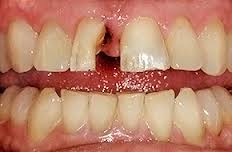
- The impossibility of further preservation of the destroyed tooth and the need for its removal.
- Full or partial adentia.
- Tooth injury with penetration into the subgingival part.
- The need for immediate restoration of the tooth after extraction.
- If urgent installation of prostheses is required.
The necessary conditions
For a one-stage implantation, the necessary conditions are required:
- The general condition of the body must be satisfactory for the success of the regeneration process.
- The presence of sufficient density and size of bone tissue - for better fixation of the implant.
- To immobilize the implant and the possibility of suturing the gums, it is necessary to have a sufficient area of the attached gum.
- The presence of a sufficient number of healthy teeth to reduce the chewing load on the implant that has not yet fused with the bone.
- The possibility of complete stabilization of the implant at the time of installation of the implant.
- The jaw bone in which the implant will be implanted must be of good quality, and its length and width should correspond to the size of the implant.
- The presence of teeth near the implant so that they can take the main load and prevent the implant from loosening.
- The absence of risk factors that can reduce the success of the operation.
If you follow some key requirements for one-stage implantation, you can avoid rejection of the implant.
Requirements for simultaneous prosthetics:
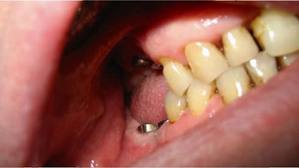
- The bone must be of good quality.
- It must be possible to install an implant with a length of 13 to 16 mm.
- The presence of keratinized gum tissue in sufficient quantity.
- The presence of real or artificial teeth near the implant that is able to protect it from loosening.
Clinical example
- A 57-year-old man came to the clinic with complete adentia and complaints about the lack of aesthetics and functional inconvenience of the dental structure. On examination, a denture on the locks installed more than five months ago was fixed on the upper jaw. In the same period, before installing the prosthesis on the upper jaw, the remaining tooth roots were removed.
- After a thorough examination, it was decided to carry out a one-stage implantation in a trans-hygienic way to install implants in the amount of 12 pieces. Five days later, it was planned to install a permanent zirconium structure.
- The next step was computer simulation and the manufacture of a surgical template that allows you to accelerate the implantation process with minimal trauma to the gum mucosa. The advantage of this template is that it provides high precision implantation.
- The implant engraftment operation was performed within two hours. In the early postoperative period, bleeding and swelling were absent.This made it possible to prepare the supragingival portion of the implants for the optimal fit of the zirconia prosthesis and to obtain more accurate casts.
- On the same day, a temporary construction was established that the patient should use before making a permanent zirconium prosthesis. During the patient’s use of the temporary prosthesis, the instructions given by the doctor must be followed.
- During the entire postoperative period, edema and bleeding were not noticed. After the installation of a permanent zirconium oxide structure, taking into account the patient’s bite, a corresponding correction was carried out.
Benefits
- Carrying out the procedure in a short period of time, perhaps even in one go.
- No need for additional examination methods before surgery.
- Reducing trauma to a minimum, because there is no stage of cutting the gums.
- Decrease in volumes of surgical intervention.
- Decrease in funds for anesthesia.
- Maintaining patient comfort and performance during treatment.
- Reducing the period of adaptation to the temporary structure.
- Restore aesthetics in the shortest possible time.
- Preservation of chewing activity.
- The absence of swelling of the patient's face after surgery.
- The cost of a one-stage implantation is lower than a two-stage implantation.
- According to statistics, the implant survival is quite high and amounts to more than 90%.
- The life of the implants is quite long.
Price comparison
Unfortunately, the one-stage dental implantation, the price of which is lower than the two-stage implantation, can be performed only in those clinics that have their own dental laboratory and qualified specialists.
When conducting simultaneous dental implants, bone plastic is not required.
Often, this technology of the operation is presented by the clinics as a non-surgical technique, which is short-lived and tolerated by the patient much easier than a two-stage one.
| Type of implantation | Prices (RUB) |
| One-stage implantation (including implant cost) | 12600 |
| Tooth extraction during simultaneous implantation (the price includes: anesthesia, examination, doctor's work, dressings) | 2500 |
| Immediate tooth implantation (including the cost of anesthesia, implant with a permanent crown, gum shaper, doctor's work, examinations, warranty) | from 30000 |
| Installation of the implant, including casts, a “turnkey” temporary crown, a cermet crown | 40000 |
| Express - “turnkey” implantation, including tooth extraction, casting, installation of a temporary crown, manufacture of a ceramic-metal crown | 50000 |
| The second stage of implantation (opening of the implant) | 2200 |
| The second stage of implantation. Gum Shaper Settings (Including Shaper) | 2500 |
Before and after photos
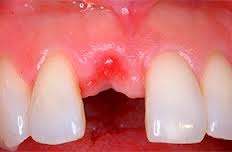 |
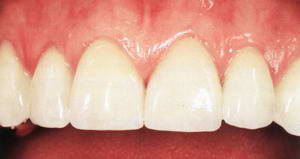 |
 |
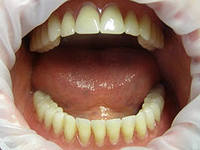 |
 |
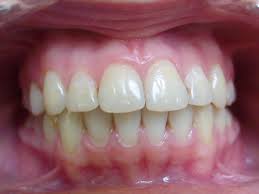 |